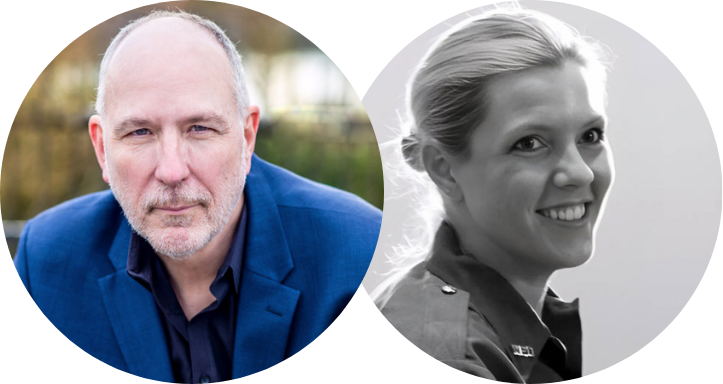ABPPSP: Foundational and Functional Competencies in Police and Public Safety Psychology
Presented by: David M. Corey, PhD, ABPP and Heather McElroy, PhD, ABPP
 This on-demand professional training program on Foundational & Functional Competencies in Police & Public Safety Psychology is presented by David M. Corey, PhD, ABPP, and Heather McElroy, PhD, ABPP, in partnership with The American Board of Police and Public Safety Psychology (ABPPSP).
This on-demand professional training program on Foundational & Functional Competencies in Police & Public Safety Psychology is presented by David M. Corey, PhD, ABPP, and Heather McElroy, PhD, ABPP, in partnership with The American Board of Police and Public Safety Psychology (ABPPSP).
This program provides an overview of the competencies required of all psychologists seeking board certification and detailed information about how those are demonstrated specifically in Police & Public Safety Psychology. It also describes the history and development of competencies in psychology, including inter-organizational adoption of the competencies, use of the competencies in articulating educational and training guidelines within and across specialties, and utilization of competencies as a basis for board certification.
Specific to Police & Public Safety Psychology, this program addresses the ten foundational competencies required of psychologists seeking board certification specifically in the specialty of Police and Public Safety Psychology. Each competency area will be defined, and examples of how psychologists can demonstrate those competencies are discussed. In addition, the program reviews the four domains of the specialty and includes a discussion of how to demonstrate functional competency in those areas.
Upon completion of this training, participants will be able to:
Key topics covered in this training include:
The competencies required of all psychologists seeking board certification
The history and development of competencies in psychology will be explained
The inter-organizational adoption of the competencies
Use of the competencies in articulating educational
Training guidelines within and across specialties
The utilization of competencies as a basis for board certification with a specialty
The 10 foundational competencies required of psychologists seeking board certification

We are proud to partner with The American Board of Police and Public Safety Psychology (ABPPSP) for this training. ABPPSP became a fully affiliated specialty board of the American Board of Professional Psychology (ABPP) on October 21, 2011. Police and Public Safety Psychology is concerned with assisting law enforcement and other public safety personnel and agencies in carrying out their missions and societal functions with optimal effectiveness, safety, health, and conformity to laws and ethics. It consists of the application of the science and profession of psychology in four primary domains of practice: assessment, clinical intervention, operational support, and organizational consultation.
Palo Alto University, Continuing & Professional Studies (CONCEPT) is approved by, recognized by, or maintains sponsorship provider status with the following boards and agencies. We maintain responsibility for all content in our CE/CPD programs. For more information, visit here.
American Psychological Association (APA): Approved sponsor of continuing education for psychologists.
Association of Social Work Boards (ASWB): Approved continuing education provider (ACE program, Provider #1480), 11/22/2023–11/22/2026.
Canadian Psychological Association (CPA): Approved to sponsor continuing education for psychologists.
National Board for Certified Counselors (NBCC): Approved Continuing Education Provider (ACEP No. 7190).
Palo Alto University, Continuing and Professional Studies (CONCEPT) is approved by the American Psychological Association to sponsor continuing education for psychologists. Palo Alto University, Continuing and Professional Studies (CONCEPT) maintains responsibility for this program and its content. Palo Alto University, Continuing and Professional Studies (CONCEPT), is approved by the Canadian Psychological Association to offer continuing education for psychologists. Palo Alto University, Continuing and Professional Studies (CONCEPT), SW CPE is recognized by the New York State Education Department’s State Board for Social Work as an approved provider of continuing education for licensed social workers #SW-0356 and the New York State Education Department’s State Board for Mental Health Practitioners as an approved provider of continuing education for licensed mental health counselors. #MHC-0073. Palo Alto University, Continuing and Professional Studies (CONCEPT) has been approved by NBCC as an Approved Continuing Education Provider, ACEP No. 6811. Programs that do not qualify for NBCC credit are clearly identified. CONCEPT Professional Training, #1480, is approved to offer social work continuing education by the Association of Social Work Boards (ASWB) Approved Continuing Education (ACE) program. Organizations, not individual courses, are approved as ACE providers. State and provincial regulatory boards have the final authority to determine whether an individual course may be accepted for continuing education credit. CONCEPT Professional Training maintains responsibility for this course. ACE provider approval period: 11/22/23-11/22/26. Social workers completing this course receive (clinical or social work ethics) continuing education credits.